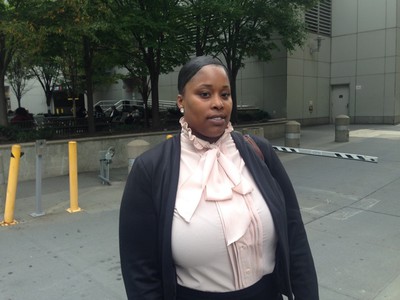An off-duty New York City police officer looked "like he didn't give a fuck" after he fatally shot an unarmed man outside his car in East New York last July 4th, according to the girlfriend of the late Delrawn Small.
Wednesday marked day two of the criminal trial for NYPD Officer Wayne Isaacs, the first cop to be charged by State Attorney General Eric Schneiderman in his role as Special Prosecutor in police-killing cases. Isaacs was charged with second-degree murder and first-degree manslaughter last September in connection with the alleged road rage incident, which ended with Small being fatally shot three times.
Prosecutors say Isaacs cut Small off in traffic on Atlantic Avenue, swerving rapidly from the right lane, to the left, and back to the right. "We were both like, what the fuck?" Zaquanna Albert recalled on the witness stand Wednesday.
Albert, 37, gave two hours of tearful testimony, describing the moment her boyfriend exited the car where she sat with her two children, ages fifteen and four months, shortly after midnight at the intersection of Atlantic Avenue and Bradford Street. The family was headed home from a Fourth of July barbecue at Albert's friend's house. Small approached Isaacs, she said, clapping his hands together and saying, "You cut us off."
"He took off his seat belt and got out," Albert recalled. "I told him not to get out because I didn't have time for it. I really wanted to get home to my [school] paper. I didn't want no nonsense."
While the defense has portrayed Small as a large, intimidating "menace," and argues Isaacs acted in self defense, prosecutors counter that Isaacs shot Small without justification. Prosecutors also dispute allegations that Small punched Isaacs before he was shot, pointing to security camera footage that appears to show Small falling back moments after approaching Isaacs's car.
Albert testified that shots rang out "seconds" after Delrawn approached the car.
"I see a spark," she said. "I see Delrawn twist off and hit the [parked] car and slide down... I was screaming."
"[Isaacs] walked over to the body," Albert added. "He looked at him, he walked back over towards the car, but he stopped and he just looked and I said, 'Don't shoot his family's in the car. Don't shoot.'"
Albert asked her daughter to call 911 and parked the car, she said, then got out and ran to Small's body, partially obscured between two other parked vehicles.
"I ran over here and see Delrawn's feet hanging out," she recalled, crying. "He was face down with his chin on the ground... he was just grunting."
While prosecutors' questioning focused on Isaac's apparent callousness in the wake of the shooting—no effort to perform CPR, for example—defense attorney Stephen Worth emphasized that Small was legally intoxicated at the time of his death, and grilled Albert on her statements to NYPD detectives in the immediate aftermath of the shooting. In particular, Albert's comment to detectives that Small "gets so angry so fast."
"What you didn't want is a violent confrontation, correct?" Worth asked Albert.
Albert pushed back, saying that she did not anticipate a violent confrontation; that she did not "beg" Small to stay in the car but simply "asked" him; that Small "did not appear to be angry when he got out of the car."
Albert became increasingly agitated as Worth asked her repeatedly if Small was big enough to block her sight line of whatever happened in the lead-up to the gunshots.
"Enough with the badgering of me," Albert told Worth.
"There's no question that [Isaacs] pulled the trigger," Worth told reporters outside court on Wednesday. "The question is, did he have the right to defend himself with his weapon? We maintain that he absolutely had the right to defend himself."
The day after Small was fatally shot last year, police killed Alton Sterling, 37, outside of a Baton Rouge, Louisiana convenience store. The next day, a Minneapolis cop killed Philando Castile, 32, during a traffic stop. The trio of fatal shootings of civilians, all black men, by police officers prompted protests in New York City and across the country.

